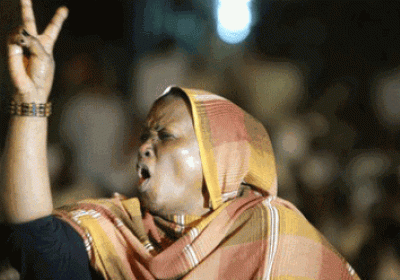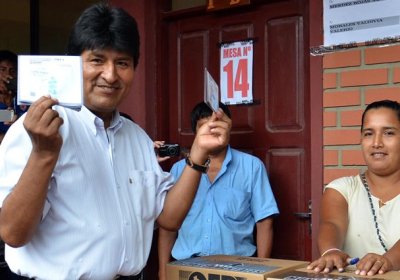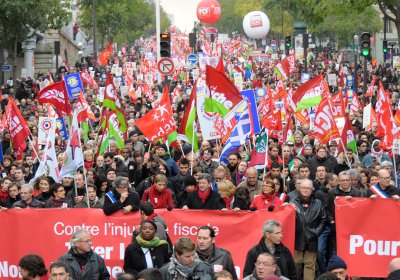A central pillar of the Spanish economic and political establishment came crashing down on Paril 16.
Rodrigo Rato, former deputy prime minister in the 1996-2004 People’s Party (PP) government of Jose Maria Aznar and head of the International Monetary Fund from 2004 to 2007, was detained on suspicion of tax evasion, concealment of assets and fraud.
Elections
Results for Sudan’s parliamentary and presidential elections, held between April 13 and 15 and extended for a further day after low voter turnout, will be announced on April 27. Yet no one doubts the return to government of President Omer al-Bashir and his National Congress Party.
The People’s Referendum: Why Scotland Will Never Be the Same Again
by Paul Geoghegan
Luath Press 2015
177 pages
The British-wide general election for the Westminster parliament scheduled for May 7 looks set to be very close, perhaps even closer than the 2010 election that resulted in the Labour Party being replaced by a Conservative Party-Liberal Democrat coalition government.
Opinion polls suggest that neither of the two main British parties, Conservative or Labour, will win enough seats for a majority of their own in the House of Commons.
Sudan’s ruling National Congress Party (NCP) persisted with April 13-15 national elections, despite widespread condemnation of the process from inside and outside the country. Sudanese President Omer al-Bashir, who came to power in a 1989 coup, contested the presidency among 15 mostly unknown candidates. The election was boycotted by opposition groups. They have called for an inclusive consultation process to resolve the country’s substantial problems, establishing a transitional government, and immediately ending the repression of dissent as prerequisites for free and fair elections.
Up to 90% of the electorate voted in Bolivia’s “local” elections on March 29 for governors, mayors and departmental assembly and municipal council members throughout the country.
The governing Movement for Socialism (MAS) of left-wing President Evo Morales once again emerged as the only party with national representation. It is by far the major political force in Bolivia, and far ahead of the opposition parties, none of which has a significant presence in all nine departments.
Spain's left-wing Podemos party would win a general election if it were held today, a Metroscopa poll released on April 12 found. General elections are scheduled for December.
Podemos, which was founded in January last year, came first with the support of 22.1% of those questioned. The opposition Spanish Socialist Workers Party (PSOE) regained lost ground to come second with 21.9% of the vote. The ruling conservative Popular Party (PP) would come third with 20.8% of the vote.
A group of Australian academics, unionists, politicians, and others have urged the US to “stop interfering in Venezuela’s domestic affairs”. More than 70 prominent Australian progressives issued an open letter to US President Barack Obama condemning US sanctions against Venezuela on April 9.
The letter, initiated by the Venezuelan Solidarity Campaign in Melbourne, is printed below. The letter was handed to US consulates in Sydney and Melbourne on April 10.
* * *
No more coups! No more interventions! Repeal the Executive Order!
Dear Mr President,
The Portuguese tax-haven and tourist island of Madeira — a watering hole of Europe's super-rich — was the unlikely site of gains for the Left Bloc and the anti-corruption citizens’ movement Together for the People (JPP) in March 29 elections for the autonomous region’s legislative assembly.
The JPP, whose lead candidate Elvio Sousa promised “a different way of doing politics … favouring the most victimised and the middle class”, won five seats (10.34%) in the 47-seat legislature.
French politics further confirmed its rightward trajectory after the second round of departmental elections on March 29.
There are 101 departments and 4108 councillor positions across the country. Departments are in charge of local roads, school buildings and buses, welfare allowances and various other local issues. But the elections also represent a barometer of the political situation in the country.
The governing nominally centre-left Socialist Party (PS) suffered a humiliating defeat against a right-wing united front headed by the centre-right Union for a Popular Movement (UMP).
 A lot is at stake in Turkey’s parliamentary elections to be held on June 7 — for the ruling Justice and Development Party (AKP) as well as the oppressed Kurdish population.
The AKP, led by President Recep Tayyip Erdogan, won 49% of the vote in the 2011 elections and holds 312 of the 550 seats in Turkey’s Grand National Assembly. A Gezici poll taken in January suggests the AKP’s support has slipped 9.7% to just under 40%.
A lot is at stake in Turkey’s parliamentary elections to be held on June 7 — for the ruling Justice and Development Party (AKP) as well as the oppressed Kurdish population.
The AKP, led by President Recep Tayyip Erdogan, won 49% of the vote in the 2011 elections and holds 312 of the 550 seats in Turkey’s Grand National Assembly. A Gezici poll taken in January suggests the AKP’s support has slipped 9.7% to just under 40%.
Within two months of the cliff-hanger election that resulted in the ALP forming a minority government, what seems like a re-run of the attempts to unseat the Julia Gillard government in Canberra is playing out in Queensland.
Despite pressure from the Labor and Liberal parties to resign his seat, in a statement issued on April 8, the former ALP, now independent, MP for Cook, Billy Gordon confirmed that he will not resign from parliament but will continue to represent his constituents.
This statement was released by Billy Gordon on April 8.
***
Last week I resigned from the Australian Labor Party. I will not resign from parliament.
My decision is based on advice from the clerk of parliament, who gave detailed reasons why I did not have to resign over past events and allegations. I am also determined to honour my commitments to my constituents.
During the election campaign I committed to tackling entrenched social and economic problems in Cook and helping communities seize economic development opportunities.
- Previous page
- Page 80
- Next page









